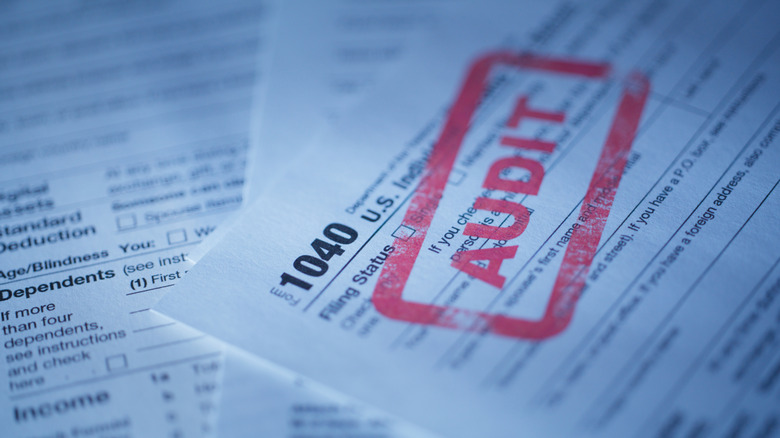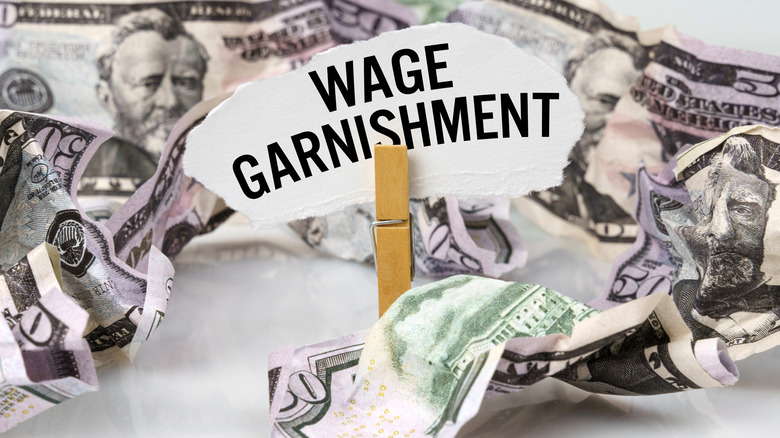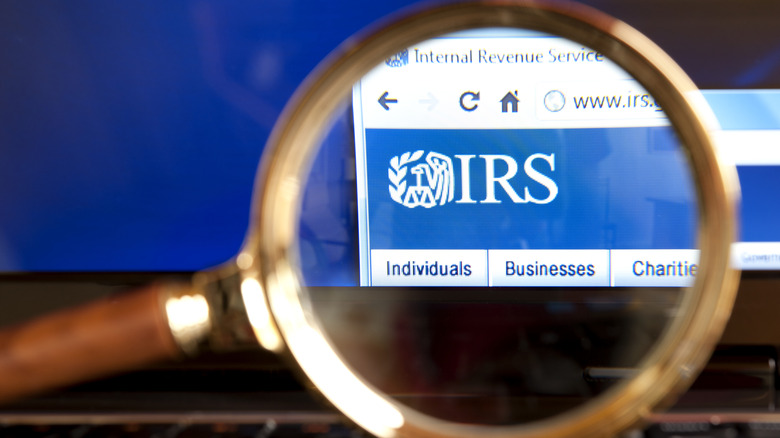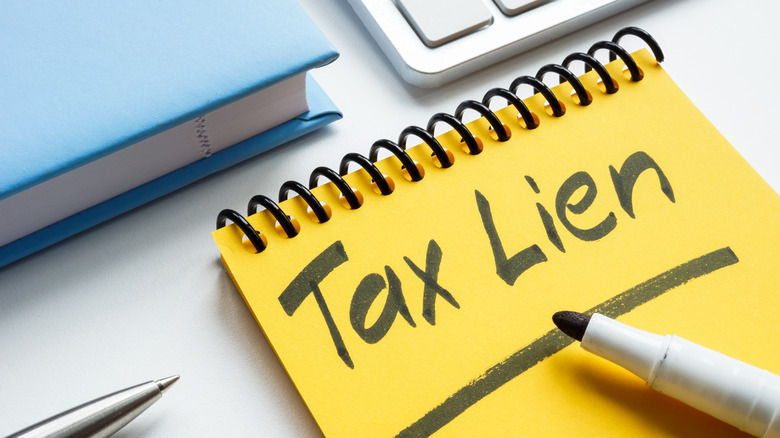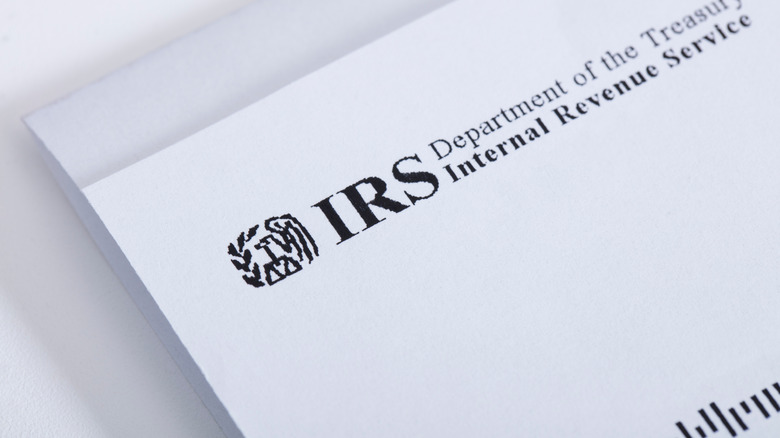Retirement Accounts The IRS Can Garnish If You Don't Pay Your Taxes
The IRS can be a sinister foe. The federal government's tax collection service has plenty of tools at its disposal when seeking to impose tax obligations on American citizens. There are a number of key strategies you can deploy to legally avoid paying taxes—reducing your obligation through deductions and credits—but all nearly Americans will have some kind of withholding in their yearly tax calculation. For some, opting to raise the withholding figure to ensure an annual refund comes back might be the best way to minimize stress over this reporting task each spring. Others will notice that the government doesn't offer any interest on the funds it has kept from you throughout the year and seek to reduce upfront payment figures as much as possible.
No matter your individual preference, paying your taxes is a duty that simply can't be avoided—at least not for long. If you do refuse to pay the tax burden you owe, the IRS can weaponize its arsenal of collection tools, seeking legal access to your bank account, salary checks, and more. While creditors in the private sphere don't have access to things like your retirement accounts when seeking to collect an overdue debt, the government enjoys wide-ranging accessibility to just about any financial asset you might own. These are some of the tools the IRS has at its disposal, as well as the retirement and other accounts and assets it can target to satisfy an individual's tax debts.
Key terms: Garnishment, levy, and lien
It might be helpful to begin with a few key terms. The IRS can utilize three primary avenues of financial pressure to engage those who fail to pay their taxes. The first is garnishment. This is an order that directs an organization to take your property or withhold payments to you. Garnishments come as a result of legal proceedings and are typically formatted as an instruction to target your paycheck or other sources of income. If the IRS uses a garnishment to recover back taxes, the government will direct your employer to withhold a portion of your salary and instead pay it to the IRS.
A levy is the actual act of taking this money from you. Levies can be placed on your paycheck or against other assets you might own, like your bank account or even investment or retirement accounts. Finally, the IRS can impose a lien on your property. This acts like a financial lock on your assets. If there is a lien on your home, for instance, you may not be able to sell it, and if you can, the first recipient of the transaction's proceeds will be the lien holder—in this case, the government. Liens can be placed on many important assets you might have at home, like a car or recreational vehicle. This won't take cash from you directly, but it does hamper your ability to manage your property without additional restrictions or hangups.
The IRS has broad garnishment power, and wages are a frequent first step
With terminology out of the way, it's important to understand that the IRS has broad power to target a wide range of accounts and other assets that you might own. Far beyond the scope of typical consumer creditors, the IRS can place restrictions on checking and savings accounts, salary payments, and a variety of retirement assets and other property. Your home, car, and recreational vehicles like motorcycles, RVs, and boats are all vulnerable to IRS collections efforts.
The scope of the government capabilities here sound intimidating. But it perhaps plays the second fiddle to the volume with which the IRS can dock your wages. Salary payments are often the first step the IRS will take in collecting back due taxes. Rather than attacking your savings or property, those who earn a regular paycheck have a consistent stream of money coming into their accounts, and therefore can (begrudgingly) provide the IRS with a steady stream of payments to get back on track. The IRS is not subjected to the same limits in its garnishment power as other creditors, as well. The IRS can take nearly as much as it desires off the top of your paychecks, so long as it leaves behind a set amount of money for your living expenses. In 2025, a head of household with two children can have their income stripped down to less than $100 per day to live on.
Your 401(k) is fair game
In addition to your paycheck, the IRS can target retirement accounts. This means your 401(k) is not safe from the federal government's collections efforts. Generally speaking, assets in your 401(k) account are safe from commercial debt collection efforts, even during bankruptcy proceedings. However, the IRS enjoys expanded access to this and other accounts, but only under certain circumstances. If you have been found guilty of criminal offense at the federal level and owe a financial penalty, the IRS can seek a portion of your 401(k) account to satisfy the punishment.
Under ordinary circumstances, the IRS won't tap into this account, however. If you are not eligible to take distributions yet as a result of age restrictions or other limitations on your retirement savings plan, the IRS won't engage in what essentially amounts to forced distributions. This is good to know, but it doesn't protect those who are over 59 ½ from potential vulnerability here. It's also worth noting that state level government entities do not share this same garnishment power, and so your 401(k) can't be leveraged in a collection attempt by state tax authorities.
Your IRA plans can be garnished as well
Your IRA plans are also vulnerable to the tax man in his efforts to collect on your liabilities. Unlike a 401(k), other creditors also have access to IRA funds in the event of a collection action. This makes an IRA even more susceptible to levies if you are someone suffering in a financial hole. It's worth noting however, that you're IRA is protected in the event of a bankruptcy up to a value of about $1.5 million.
Because of this expanded vulnerability, those considering where to focus most of their retirement saving focus will want to think hard about this decision. Most savers don't expect or intend to go through bankruptcy or find their income sources drying up, potentially then falling behind on bills or other repayment obligations. However, a hard look at your financial picture can be instructive here. If you are in a position that includes a bit of danger, leaving money in your 401(k) account or focusing new savings in this vehicle can protect it a little better in the event of creditor action. However, as mentioned above both types of retirement accounts are equally susceptible to the IRS's collection efforts so you won't get a reprieve with one account over the other in that regard.
The IRS could instead leverage a bank levy
Instead of targeting your retirement accounts and income sources, the IRS could instead place a bank levy on your checking or savings account. Recovering back taxes over the course of many months in slivers off the top of your paycheck, the IRS can gain financial information about your account holdings. Many people keep their emergency savings fund in a high-interest savings account (a sign you're above average financially). This keeps the money easily accessible while also earning decent volume of interest on the cash. This is a great strategy that can benefit you in numerous ways. However, with as much as six months' worth of expenses resting comfortably in the savings account, the IRS might opt to seize some or all of this funding to settle your tax liability.
The result can be quite jarring for a person who has meticulously developed this backstop. Rather than paying back the IRS on your own terms, a bank levy offers it by means of simply seizing your cash assets. The 2022 median figure across all financial accounts for American households was $8,000 (via U.S. Federal Reserve). At the same time, 60% of Americans reportedly would turn to a payment method other than cash savings to cover an unexpected $1,000 expense (according to a Bankrate survey). This suggests that even if you have the cash on hand to pay off an outstanding tax debt, most Americans would prefer not to part with this money, emergency savings or otherwise, and instead seek a different approach to clearing the obligation.
Tax liens against your property or even seizure is possible
Another collection format that the IRS can leverage is a tax lien. The IRS might opt to go straight toward this route in seeking to engage with taxpayers, or this might come as the result of limitations elsewhere. For instance, the IRS might choose to levy one of your bank accounts, and then place a tax lien on your home or car in order to make up the remainder of your debt if that account won't satisfy the obligation on its own.
A tax lien can cover all of your property and may apply to additional property you purchase in the future as well. During this process, the IRS will file a Notice of Federal Tax Lien that sticks with you and can affect your ability to borrow money in the future. The impact on your credit can be significant, as a result. This approach formalizes the federal government's assertion of rights over your financially valuable property. You may not be able to sell certain assets with a lien in place, and others will bring back a significantly reduced value to you if you do part ways because the government will take its piece first. In extreme scenarios, the government can also seize your assets and sell them in an attempt to collect on your back due taxes.
The IRS can also seek to seize foreign assets and money in foreign accounts, but the process is complicated
Some Americans have financial interests that expand beyond the borders of the United States. Those who live abroad or have spent time outside the country may have property elsewhere or maintain bank accounts in foreign countries. It might be tempting to think that an account or asset located overseas is untouchable as a result of jurisdictional conflicts, but the reality is that the IRS has broad seizure capabilities that expand beyond the borders of the United States. Generally speaking, the IRS does maintain the ability to impact or even seize foreign assets. This means that hiding accounts overseas is not possible a la the infamous Swiss bank account of old. Today, opening an account anywhere in the world as an American comes with additional reporting responsibilities. Essentially, the IRS has the ability to uncover the existence of foreign accounts, wherever you open them.
With that being said, the process with which the IRS might go about seizing foreign-based assets is convoluted and potentially lengthy. This means that your cash or property abroad isn't safe from the IRS's grasp, but it will likely take longer for the federal government to obtain access to it, as a functional matter. Working through international agreements and legal hurdles takes time, but when the federal government is motivated to collect on your debt time is really just a triviality and eventually it will run out for a non-taxpayer seeking to dodge their obligations.
Retirees can be hit particularly hard by these measures
Even though the IRS has broad powers to collect on back due taxes, retirement accounts are particularly vulnerable, as are people living in the retirement phase of their lives. A levy on your retirement accounts delivers a mammoth one-two punch that can drastically impact your financial future. If the IRS successfully collects from your retirement assets, it will reduce your overall asset pool, perhaps even substantially. You may have to sell shares in order to satisfy this repayment obligation, skewing your account's delicate balance out of whack. Chomping into the principal value of your account is bad enough, but it also impacts the mobility of that capital long into the future. If you are early in retirement, you may still be seeking to leverage some of your assets in growth vehicles to continue providing opportunities for overall expansion even as you initiate your drawdown phase.
Others may be much farther into retirement and therefore heavily reliant on the principal value of their investments remaining stable. Whether you're a dividend investor seeking to draw out monthly retirement income primarily from these routine payments or a value trader who is gradually selling off assets as the market continues to expand their value, losing a sizable chunk of your accounts balance can be devastating. Recovering from this sudden blow often isn't easy, sometimes it can be impossible.
Seizures only happen after the IRS has followed a set of specific steps
Seizures and other actions that the IRS can take to cover back taxes can only happen after the federal government has followed a specific legal workflow. The first step here is to send reminder notices. The IRS will always contact you through the mail, and so if you receive a phone call from someone claiming to be reaching out from the federal government about your tax liability, it's likely that you're the target of a scam. This is an important distinction, and it can short circuit any other conversations surrounding collection options. If indeed the IRS truly is seeking to reach out to you about an unpaid tax liability, numerous reminder notices will come through your mailbox spelling out the liability and steps you can take to remedy the situation.
Eventually, if you receive a sequence of these notices and don't get in touch or explore options on your own to rectify the shortfall, you will receive a Final Notice of Intent to Levy from the IRS. Again, this will come in the mail, so any other format that you received this kind of correspondence signals illicit behavior and is not a legitimate communication from the IRS. You will have a right to a hearing and other options to clear up this matter before the IRS ultimately seeks to take matters into its own hands. Similarly, this notice must come to you at least 30 days before the federal government actually takes action against you.
The key to avoiding these kinds of punitive measures is to talk to the IRS when a problem arises
All of these potential consequences can be detrimental to your present and future finances. The hit that your credit report takes and the financial calamity of having your wages docked or your savings account raided are all major catastrophes that can befall a taxpayer. But the reality is that all of these disastrous consequences are entirely avoidable. Sometimes, the IRS has their math wrong. It's entirely possible that you've been targeted for review and the IRS has come up with new calculation for your tax burden based on inaccurate information. It's also possible to intentionally miscalculate your annual tax liabilities, and the IRS has simply caught up with your scheme.
No matter the reason that you've received a letter from the IRS, the best thing you can do is pick up the phone and call the number on the notice. Disputes about your personal tax obligation and difficulty in paying a surprise adjustment are not uncommon. In order to avoid the problems that come from the IRS simply acting on its own all you have to do is respond. The IRS isn't looking to drown you in new debts and the people you'll interact with over the phone are generally reasonable and understanding. It's entirely possible to make a mistake, and so if that miscalculation is on your end, the IRS will be willing to work with you through a payment plan or even an offer in compromise to pay off the obligation at a lesser rate. None of this is possible if you don't pick up the phone and make a call, however.
